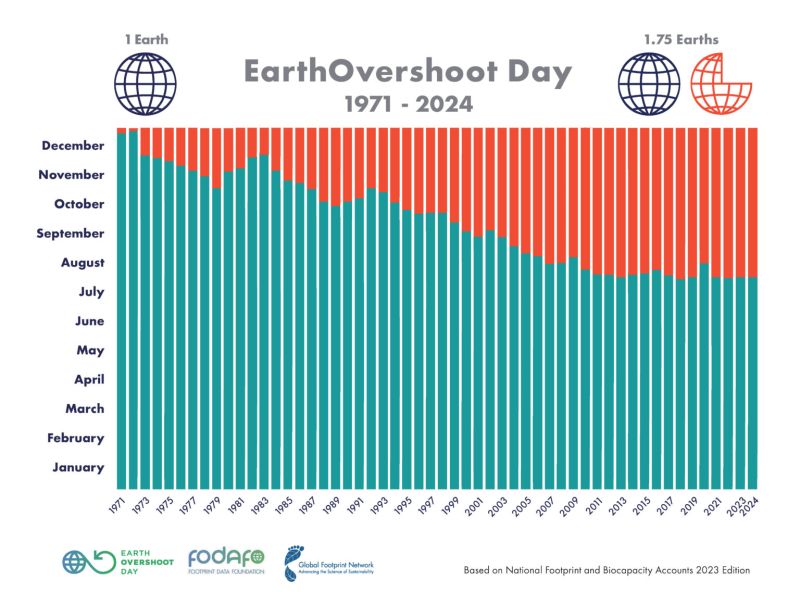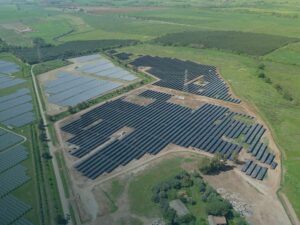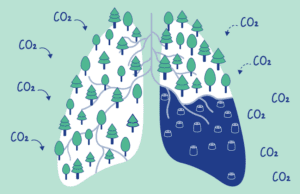Key Impact Points:
- Earth Overshoot Day falls on August 1st, highlighting humanity’s use of resources 1.7 times faster than Earth can regenerate.
- Ecological overspending leads to deforestation, biodiversity loss, and increased carbon dioxide levels, worsening climate change.
- Solutions exist to #MoveTheDate, focusing on key areas such as cities, energy, food, population, and the planet.
August 1st marks Earth Overshoot Day, the date when humanity’s demand for nature’s resources exceeds what Earth can regenerate within a year. This milestone, calculated by the Global Footprint Network, underscores the urgent need for sustainable practices to reverse our ecological debt.
Background
Earth Overshoot Day signifies that humanity is currently using nature 1.7 times faster than our planet’s ecosystems can regenerate. This overshoot is possible because people can harvest more than is being renewed, thereby depleting natural capital.
Consequences of Overshoot
- Resource Depletion:
Overuse compromises resource security, leading to deforestation, soil erosion, and biodiversity loss. The buildup of carbon dioxide in the atmosphere exacerbates climate change, resulting in more frequent extreme weather events and reduced food production. - Accumulating Damage:
Although Earth Overshoot Day has held steady for a decade, it occurs just after 7 months of the year have passed, indicating that the pressure on the planet continues to increase as damage from overshoot accumulates over time. - Historical Context:
In 1936, when Jesse Owens won four gold medals, humanity used 0.6 Earths. By 1968, when Dick Fosbury revolutionized the high jump, this had increased to 0.9 Earths. By 1992, when the U.S. basketball ‘dream team’ won gold, it had jumped to 1.2 Earths. Today, we use 1.7 Earths, highlighting the rapid increase in ecological overshoot.

Expert Insights
Lewis Akenji, Global Footprint Network board member, emphasizes: “Overshoot will end. The question is how: by design or by disaster. A planned transition gives us better security than ceding to the whims of a planet thrown off balance by overshoot.”
Debora Barioni of Global Footprint Network adds: “Ending overshoot is essential. It is also possible, given human potential.”
Solutions to #MoveTheDate
Opportunities to reverse ecological overshoot exist in five key areas: Cities, Energy, Food, Population, and Planet. The Power of Possibility highlights actions that can move Earth Overshoot Day later in the year. For instance, cutting CO2 emissions from fossil fuels by 50% could move the date by three months.
Key Areas for Action
- Cities: Implementing sustainable urban planning to reduce resource consumption and waste.
- Energy: Transitioning to renewable energy sources and increasing energy efficiency.
- Food: Adopting sustainable agricultural practices and reducing food waste.
- Population: Promoting education and family planning to stabilize population growth.
- Planet: Preserving natural habitats and biodiversity to maintain ecological balance.
Conclusion
Earth Overshoot Day 2024 serves as a stark reminder of humanity’s growing ecological debt. To secure a sustainable future, we must leverage our potential for innovation and change, implementing solutions that address resource overuse and environmental degradation.
Call to Action
Individuals, businesses, and governments must work together to #MoveTheDate by embracing sustainable practices in all aspects of life. By focusing on key areas of opportunity, we can reduce our ecological footprint and ensure a thriving planet for future generations.
Additional Resources
- How Earth Overshoot Day 2024 was calculated
- How to compare the date of Earth Overshoot Day to previous years
- Ecological Footprint data for more than 200 countries and regions
- Infographics and videos available for media
- Introduction to the implications of overshoot
- Ecological Footprint Data
- What it means for businesses
- Solutions to reverse ecological overshoot and bolster biological regeneration
- Ecological Footprint: Managing our Biocapacity Budget (book)
- Footprint Calculator

 Follow SDG News on LinkedIn
Follow SDG News on LinkedIn











